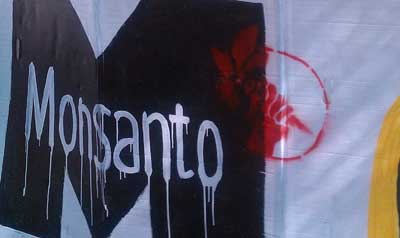
Apparently discontent with its more than $13.5 billion-plus in annual sales, genetic modification kingpin Monsanto has been trying for the past four-or-so years to extract billions more dollars from rival DuPont for alleged patent infringements involving its genetically-modified (GM) Roundup-Ready soybean technology. And the agri-giant has apparently achieved this goal, having recently settled its longstanding feud with DuPont in exchange for a massive $1.75 billion royalty payout to be delivered over the course of the next 10 years, according to reports.
As we covered last year, Monsanto has been waging war against DuPont since at least 2002, when the corporate monolith decided that DuPont had violated its licensing agreements by borrowing a Roundup-Ready trait for use in its rival soybean product, known as Optimum GAT. Following the initiation of a lawsuit by Monsanto against DuPont for this alleged infringement, DuPont counter-sued, alleging that Monsanto had illegally obtained its patent on the Roundup-Ready trait in question, rendering it unenforceable.
But the two companies have finally agreed to call it quits, according to Phys.org, presumably because both of them are in the wrong and are trying to avoid encountering any further obstacles in their mutual GMO-propagating Ponzi scheme. The two companies will now work together, in other words, to spread more GMOs around the world, and utilize each other’s technologies for the implied purpose of maximizing corporate profits in the process.
Joint Agreement Between Monsanto, DuPont Has Created the World’s Largest GMO Monopoly
For years, DuPont has alleged that Monsanto is a threat to innovation, as the biotechnology bully dominates large and growing segments of industrialized agriculture. And DuPont has been correct in this assessment, which became the crux of its legal argument against Monsanto. But now that the two companies have agreed to partner together, the world faces a much larger threat in the form of a massive GMO cartel controlled by Monsanto.
“DuPont is the last of the big four to sign up to use Monsanto’s genetically engineered herbicide resistant soya (soy) bean traits,” explains gmeducation.org, referring to Monsanto, DuPont/Pioneer Hi-Bred, Syngenta, and Dow AgroSciences, which collectively own roughly 80 percent of the U.S. corn market and 70 percent of the soybean market.
“[DuPont] will pay Monsanto $1.75 billion over the next 10 years … A good deal for Monsanto but even more significant is that DuPont is to drop its antitrust lawsuit against Monsanto … given that currently more than 80 percent of U.S. corn (maize) and more than 90 percent of soya (soy) beans contain Monsanto licensed gene traits, it must have had a good chance of winning and curbing Monsanto’s virtual monopoly of a key part of the U.S. seed industry. This deal puts an end to that, and instead puts Monsanto in a position of massive strength.”
What this means for the average consumer, of course, is more GMOs hitting the market in the future with less regulatory hoops through which they have to jump. It also puts Monsanto in an even more opportune position financially and politically to thwart efforts at GMO labeling, for instance, which have grown substantially at the grassroots level all across the country in recent years.
Join us in defending the truth before it’s too late
The future of independent journalism is uncertain, and the consequences of losing it are too grave to ignore. To ensure Truthout remains safe, strong, and free, we need to raise $44,000 in the next 6 days. Every dollar raised goes directly toward the costs of producing news you can trust.
Please give what you can — because by supporting us with a tax-deductible donation, you’re not just preserving a source of news, you’re helping to safeguard what’s left of our democracy.